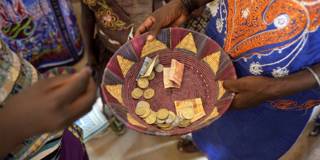Many developing countries carry crushing debt burdens, but are reluctant to pursue much-needed restructuring, for fear of losing access to capital markets. This fear is overblown, and its persistence is raising the risks for debtors and creditors alike.
FRANKFURT – Since the COVID-19 crisis began, the specter of sovereign default has loomed over developing economies. Many sovereigns are so afraid of losing market access that they are unwilling to address debt-sustainability problems. Yet a clear-eyed look at the impact of the COVID-19 crisis, together with the fiscal and financing realities for low-income countries, reveals a “new normal,” in which a timely default is far from the worst-case scenario.

FRANKFURT – Since the COVID-19 crisis began, the specter of sovereign default has loomed over developing economies. Many sovereigns are so afraid of losing market access that they are unwilling to address debt-sustainability problems. Yet a clear-eyed look at the impact of the COVID-19 crisis, together with the fiscal and financing realities for low-income countries, reveals a “new normal,” in which a timely default is far from the worst-case scenario.